News
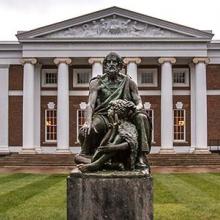
Professors Steve Parks and Kevin Smith honored by CCCC as research collective on “Composition, Rhetoric, and Literacy—What We Know, What We Need to Know”

Professors Steph Ceraso (episode 84) and Kate Stephenson (episode 96) interviewed for “Pedagogue” podcast

Professor Kevin Smith et al awarded LTI grant
The College’s Learning Technology Incubator (LTI) Grant Program funded “Pedagogical Portals: Platforms to Support Community-Engaged Classrooms.” The project will, as the title suggests, build out a digital platform to support community-engaged pedagogy in the Writing & Rhetoric Program and beyond. The project includes Kevin Smith, Steve Parks, Kate Stephenson, Kate Kostelnik, and Steph Ceraso.

New Writing Faculty Fall 2020
The Writing and Rhetoric Program welcomes David Coyoca.
David Coyoca joined us from the University of Illinois, where he earned his MFA in 2007 and served as a Rhetoric Instructor, a Visiting Assistant Professor in Latina/Latino Studies and Asan-American Studies, and a Latina/Latino Writing Specialist and Lecturer. At UVA he holds a joint appointment in English and American Studies and serves as the Writing and Rhetoric Program’s point person for supporting students from the Transition and Athletics programs and all students who will benefit from additional support in writing. He teaches courses in composition, literature, and American Studies.
Nearly 50 Students Present at Fall Community Writing Symposium
Projects by students of Professors Stephenson, Kostelnik, Parks, and Smith.
Community Writing Symposium
On Tuesday, December 3rd, over 45 students presented their writing and research to dozens of visitors at the Community Writing Symposium sponsored by the Writing and Rhetoric Program at UVA. The event showcased projects created in community-focused courses in which students engaged with local and international communities. This innovative approach to learning couples the traditional classroom with real-world experience.
Over half the students were enrolled in Kate Stephenson’s first-year writing course, “Writing about Food Equity,” which explores food insecurity and the ways in which it intersects with other social justice issues, including affordable housing, homelessness, racism, poverty, and health care access. Students pair their classroom learning with weekly work in the community at various locations in Charlottesville, including The Haven, Loaves and Fishes, PVCC Community Garden, and PB&J Fund. Writing enables students to explore the connections between the classroom and the community in powerful ways, as evidenced by the projects they created with and for these organizations. For example, Waverly Nohr and Rewan Kheraby filmed a short documentary, “Growing from the Ground Up,” about community gardens as sites not only of food production, but also empowerment and comradery. “Humans of the Haven,” a website that seeks to debunk stereotypes about homelessness, uses photos, interviews, and string art to tell the stories of guests and volunteers at The Haven, a local day shelter in Charlottesville.
Other courses represented included Kate Kostelnik’s “Tutoring and Writing Across Cultures,” Kevin Smith’s “Writing Charlottesville,” and Steve Parks’s “Democracy and Human Rights.” Kostelnik’s students spent the semester considering what it means to write, communicate, and learn across cultures. Students partnered with multi-lingual learners at Latinx and Migrant Aid or ESOL programs. Projects reflected their impressive ability to use dialogic engagement to support collaboration and conversation across cultures. Smith’s course asked students to think critically about local community, its tensions, complexities, and nuances. The student projects show a wide-range of research interests, as the following titles suggest: “Growing Up with Charlottesville: A Perspective on Charlottesville Through Barrett Early Learning Center” (Mihir Prahlad), “Defining the Ethical Boundaries Around Data Science” (Grace Jones), and “ Art as an Agent for Gentrification: Case Study of Ix Art Park” (Virginia Ruhland-Mauhs).
An international focus on community and collaboration provides a unique learning experience in “Democracy and Human Rights,” a course taught by Steve Parks that partners UVA students with learners in Algeria. Through Skype and other online communications, participants work together to write and edit a book, the galley proofs of which were available for guests to peruse at Tuesday’s event.
While this is the fourth consecutive Community Writing Symposium, this is the first time that so many classes have participated. It also marks the first time that guests from the Haven, who meet in a weekly writing group, led by Rob White, day shift manager at the Haven, and Professor Stephenson, participated in the event. Their short stories, poems, and visual art added powerfully to the conversation about community and social justice. Visitors from all the community partners as well as around the university mingled with students and the Haven writers for energetic conversation about writing, community, and activism.
Stephenson expects that upcoming grants will fund more community partnerships, increased partner-driven writing projects, expanded course development, a larger symposium, faculty training, internship opportunities for students, and an annual publication.

New Writing Faculty fall 2019
The Writing & Rhetoric Program welcomes Heidi Nobles and Cheryl Pallant.
Heidi Nobles, Assistant Professor, General Faculty, Associate Director of Writing Across the Curriculum
As a rhetoric and writing scholar, Heidi Nobles focuses on the ways in which text editors shape finished products—and the ripple effects of those changes in authors, readers, and communities. She has worked as a book editor for academic and commercial publishers for the past fifteen years, collaborating with other scholars, authors, and publishers on shaping ideas and manuscripts toward social ends. Her research blends the past with the present by recovering historical editorial praxis (primarily in the Classical era, in conjunction with rhetorical history) while also documenting current praxis in locations including publishing houses, writing centers, and libraries.
Nobles’s work has appeared or is forthcoming in Advances in the History of Rhetoric, WLN Journal, Scholarly Editing, Computers and Composition Online, and the South Atlantic Review. She has also worked on extended grant-funded veterans research, including serving as site coordinator for an NEH summer institute and editing multiple years’ worth of conference proceedings for preservation in the host institution’s digital repository. Professionally, she has written for a variety of nonprofit groups focused on poverty intervention, refugee resettlement, higher education, and community publishing. She is currently revising her dissertation project into both article and book manuscript form. That project was originally titled Editing Culture: The Rhetorical Work of Textual Editing as Shaping Collective Memory and Social Action.
Nobles earned her PhD in Rhetoric and Composition from Texas Christian University (2018), her MFA in Creative Writing from the University of South Carolina (2011), and her MA in English Literature from Baylor University (2006). As UVA’s Associate Director of Writing Across the Curriculum, Nobles will work with schools, departments, and programs outside of English, by helping to design curriculum that incorporates writing as a means of improving student understanding, achievement, and retention. This fall, she will be teaching two sections of “Writing and Critical Inquiry,” under the title “Writing Material: A Scientific Approach to Artful Communication.” The course emphasizes material research and writing methods that bridge the arts and sciences in order to encourage fresh student perspectives on writing activity.
Cheryl Pallant, Lecturer
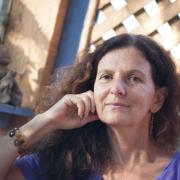 Cheryl Pallant is an award winning author, poet, dancer, and healer. Her twelve books span poetry, nonfiction, memoir, and short fiction. Most recently released is Writing and the Body in Motion: Awakening Voice through Somatic Practice (McFarland and Company, 2018), a nonfiction books that discusses the intersection of writing with body awareness, Ginseng Tango (Big Table Publishing, 2017), her memoir about her time in South Korea, and Her Body Listening (Blaze Vox Books, 2017), a collection of poetry. Her book, Contact Improvisation: an Introduction to a Vitalizing Dance Form, is considered the primary book in the field. Poetry, fiction, and nonfiction have appeared in numerous print and online magazines such as Fence, HOW2, Tarpaulin Sky, North Dakota Quarterly, and Oxford Magazine and anthologized in places like Introduction to the Prose Poem and Hope Beneath Our Feet. She has published over 200 reviews and interviews with writers, dancers, performance artists, and spiritual practitioners and was dance critic for a local newspaper for twelve years.
Cheryl Pallant is an award winning author, poet, dancer, and healer. Her twelve books span poetry, nonfiction, memoir, and short fiction. Most recently released is Writing and the Body in Motion: Awakening Voice through Somatic Practice (McFarland and Company, 2018), a nonfiction books that discusses the intersection of writing with body awareness, Ginseng Tango (Big Table Publishing, 2017), her memoir about her time in South Korea, and Her Body Listening (Blaze Vox Books, 2017), a collection of poetry. Her book, Contact Improvisation: an Introduction to a Vitalizing Dance Form, is considered the primary book in the field. Poetry, fiction, and nonfiction have appeared in numerous print and online magazines such as Fence, HOW2, Tarpaulin Sky, North Dakota Quarterly, and Oxford Magazine and anthologized in places like Introduction to the Prose Poem and Hope Beneath Our Feet. She has published over 200 reviews and interviews with writers, dancers, performance artists, and spiritual practitioners and was dance critic for a local newspaper for twelve years.
Forthcoming is a chapter on Zen, embodiment, dance, and evolutionary spirituality in Spiritual Herstories and an essay on the innovative poetry of George Quasha. She is at work on two poetry collections and a nonfiction book on consciousness, perception, and integrative awareness.
She received the Theresa Pollak Prize for Excellence in the Arts, was Finalist for the Virginia Books Award, the Southeastern Book Association, and the Bechtel Prize. She received several grants from the National Endowment for the Arts in partnership with the Richmond Arts Council.
Before joining University of Virginia, she taught at University of Richmond, University of Tulsa, and Keimyung University (in South Korea). She leads workshops on writing, poetry, contact improvisation, Writing From the Body, and meditation at schools, hospitals, and art and spirituality centers throughout the U.S. and abroad. She practices meditation, drawing from more than four decades of Transcendental Meditation, Tibetan Bon Buddhism, and Soto Zen, is certified in Reiki and Healing Touch, and is co-founder of Integral Meditation Group.
For Fall 2019, she is teaching Contemplative Somatic Writing.

New Writing Faculty
The Academic and Professional Writing Program welcomes five new faculty members this Fall.
Kiera Allison, Assistant Professor, General Faculty
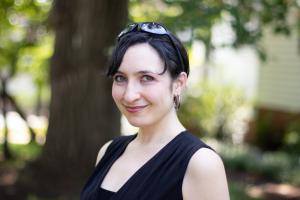 A literary critic, sound historian, and medical humanist, Kiera Allison specializes in the history of listening and sound in the context of the modern clinic. Her research covers the last two centuries of cardiology, neurology, and psychoanalysis (from the invention of the stethoscope in 1819 to the rise of Freud and the talking cure in the 1890s, to the narrative-medicine movement of the latter 20th century), which she studies against larger trends in postclassical dialogue, poetics, and music.
A literary critic, sound historian, and medical humanist, Kiera Allison specializes in the history of listening and sound in the context of the modern clinic. Her research covers the last two centuries of cardiology, neurology, and psychoanalysis (from the invention of the stethoscope in 1819 to the rise of Freud and the talking cure in the 1890s, to the narrative-medicine movement of the latter 20th century), which she studies against larger trends in postclassical dialogue, poetics, and music.
Allison was a doctoral fellow of the Social Sciences and Humanities Research Council of Canada (2007-2010), and a postdoctoral fellow at Emory University’s Fox Center for Humanistic Inquiry (2017-18) where she worked on her current book-in-progress, Sound Relations: The Culture of Listening in Modern Medicine. She earned a B.A. in English from the University of Toronto, and a Ph.D. in English language and literature from the University of Virginia.
This academic year, Allison will be teaching classes on “Public Speaking” and “Writing about Medicine,” while researching the uses of narrative and close-listening in medical and premedical education.
Tamika L. Carey, Associate Professor
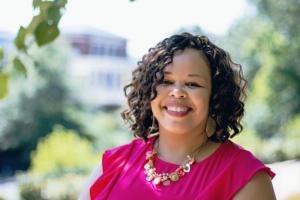 Tamika L. Carey is an interdisciplinary scholar and teacher specializing in cultural and feminist rhetoric practices, African-American rhetorical and literacy traditions, Black women’s writing and intellectual histories, and the memoir. She is committed to studying how writing, language, and assumptions about literacy promote and complicate the wellbeing of Black women and African-American communities at large.
Tamika L. Carey is an interdisciplinary scholar and teacher specializing in cultural and feminist rhetoric practices, African-American rhetorical and literacy traditions, Black women’s writing and intellectual histories, and the memoir. She is committed to studying how writing, language, and assumptions about literacy promote and complicate the wellbeing of Black women and African-American communities at large.
Her articles appear in such journals as Rhetoric Review, Enculturation: A Journal of Rhetoric, Writing, and Culture, Signs: A Journal of Women in Society, and Rhetoric Society Quarterly. Her 2016 book Rhetorical Healing: The Reeducation of Contemporary Black Womanhood is a feminist critique of African-American self-help culture that unearths the messages about gender, learning and community obligation circulating within three of the most popular black women’s wellness campaigns of the last three decades. She is currently working on two research projects: a study of apologia and call-out culture centralizing women’s freedom of speech controversies and an exploration of writing and healing practices in the memoir.
In addition to her scholarly writing, Carey is the author of Getting to Know Him: Observations and Experiences from My Walk of Faith, an inspirational memoir, and several magazine articles.
Before joining the Arts & Sciences faculty, she served as an English faculty member and a Women, Gender, and Sexuality Studies faculty affiliate at the University at Albany, SUNY and a member of the University of North Carolina at Pembroke’s English, Theater, and Foreign Language Department and African American Studies program. She holds a doctorate from Syracuse University’s Composition and Cultural Rhetoric Program and a Certificate of Advanced Studies from its Women, Gender, and Sexuality Studies department.
This fall, she will teach an advanced writing seminar on the multicultural memoir. She looks forward to teaching courses in Black women’s writing and rhetoric, and African-American rhetorics in the near future.
Anastatia Curley, Associate Director of Pedagogy and Assistant Professor, General Faculty
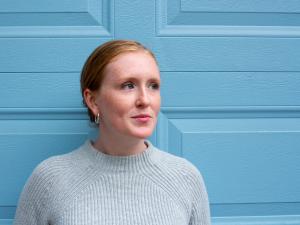
At the intersection of novel studies, new media studies, and writing studies, Anastatia Curley's research considers the relationship between the form and history of the novel and the ways that social media encourages users to share themselves with the rest of the world. Her book project, tentatively titled Friends and Followers, examines techniques of character in contemporary novels and the modes of relation they imply. Her work has appeared in Politics/Letters and The Atlantic.
Curley earned her Ph.D. in English from the University of Virginia and holds a bachelor's degree in English from Yale University and a master’s degree in Irish Studies from Boston College. This year, she will be teaching Writing and Critical Inquiry seminars as well as a graduate course on pedagogy.
T. Kenny Fountain, Director of Writing Across the Curriculum and Associate Professor
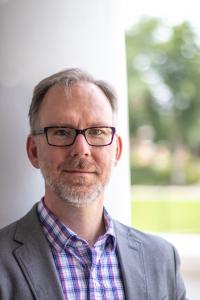 T. Kenny Fountain’s primary research areas are the history of rhetoric, the rhetoric of science and medicine, and writing in the disciplines. He is the author of Rhetoric in the Flesh: Trained Vision, Technical Expertise, and the Gross Anatomy Lab (Routledge, 2014), an ethnographic study of the human cadaver lab that examines how rhetorical discourses, visual objects, and embodied practices facilitate learning while simultaneously shaping medical and dental students’ conceptions of the human body.
T. Kenny Fountain’s primary research areas are the history of rhetoric, the rhetoric of science and medicine, and writing in the disciplines. He is the author of Rhetoric in the Flesh: Trained Vision, Technical Expertise, and the Gross Anatomy Lab (Routledge, 2014), an ethnographic study of the human cadaver lab that examines how rhetorical discourses, visual objects, and embodied practices facilitate learning while simultaneously shaping medical and dental students’ conceptions of the human body.
Fountain’s current book project, "To See What is Persuasive: Politics, Affect, and the Rhetorical Imagination," reads contemporary political texts in light of ancient Roman rhetorical theory and recent cognitive science, in order to demonstrates how a kind of verbal vivacity stirs our passions by exploiting our memories, identifications, and prejudices.
Fountain earned his Ph.D. in Rhetoric and Scientific Communication from the University of Minnesota. He has worked in writing program administration at Bilkent University, Yeshiva University, and Case Western Reserve University. As the new Director of Writing Across the Curriculum, he will assist the Quality Enhancement Plan focused on student writing and work with individual schools, departments, and programs that seek to incorporate writing instruction into their courses.
This fall Fountain will teach a section of “Writing About Science and Technology.”
Kevin Smith, Assistant Professor, General Faculty
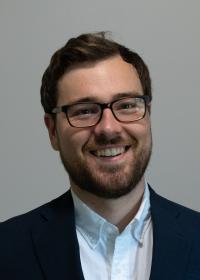 Kevin G. Smith’s research interests sit at the intersection of writing studies and the digital humanities and include digital rhetoric and writing, markup languages, rhetorical genre studies, writing pedagogies, and writing program administration. His research is broadly concerned with the rhetorical practices of students and other writers across contexts working within and through digital technologies and his work has appeared in Computers and Composition, Research in the Teaching of English, and Digital Humanities Quarterly.
Kevin G. Smith’s research interests sit at the intersection of writing studies and the digital humanities and include digital rhetoric and writing, markup languages, rhetorical genre studies, writing pedagogies, and writing program administration. His research is broadly concerned with the rhetorical practices of students and other writers across contexts working within and through digital technologies and his work has appeared in Computers and Composition, Research in the Teaching of English, and Digital Humanities Quarterly.

New Advanced Writing Courses for Fall '18
ENWR 2520 008: Legal Writing
M 6-8:30
Annie Kim
Examines the building blocks of legal writing to sharpen written advocacy skills. Using culturally relevant case studies and legal texts, we’ll learn how to write for different audiences—courts, clients, attorneys. We’ll work in teams to craft responses to each other’s writing. Both students pursuing legal careers and those seeking to strengthen their persuasive writing will benefit from this course. (Meets second writing requirement.)
ENWR 3559 001: From Hieroglyphics to Emojis: Experiments with the History of Writing
MW 5-6:15
Patricia Sullivan
The invention of writing was amazing and its reinvention is ongoing. This course takes a creative and hands-on approach to the millennia long history of writing in a global context. Together, we will explore the historical and cultural role of writing and writers from early scribes and clerks to contemporary poets, essayists and bloggers. Whenever possible, we will not only read about different writing materials, techniques and cultures, but also conduct writing “experiments.” Perhaps we will write with a feather pen and homemade ink; create an illuminated manuscript; type with a manual typewriter; write with new technologies and electronic genres to create web pages; work with dictation software, texting, or algorithmic writing (let the computer do the writing). We will explore the relation of speaking to writing in historical and social contexts – ancient Greece, Egypt, American slavery and emancipation, contemporary Ted talks – but we will also compose for our own speaking and writing contexts. We will explore historical and cultural writing groups – scribal cultures, community writing groups, creative writing workshops, fan fiction sites, zines (online and print) – but we will also create our own writing groups and projects. Students will write regularly both analytically and creatively, will be encouraged to explore their own writing interests, and will compose longer creative or analytical (or both) projects. This course will allow us to consider, as both readers and writers, what the history of writing in a global context might contribute to our current conceptions of writing in a context that is increasingly dominated by other technologies of communication. This seminar is discussion-oriented and writing-intensive.
ENPG 3559 001: Cross-Cultural Tutoring
MW 3:30-4:45
Kate Kostelnik
In this course, we’ll look at a variety of texts from academic arguments, narratives, and pedagogies, to consider what it means to write, communicate, and learn across cultures. Topics will include contrastive rhetorics, world Englishes, rhetorical listening, and tutoring multilingual writers. A service learning component, in partnership with Madison House, will require students to volunteer with the LAMA (Latinx and Migrant Aid) or ESOL programs. We will discuss pedagogies and practical, strengths-based strategies in working with multi-lingual learners on their writing; tutor members of the Charlottesville community; and create writing projects that convey learning from these experiences. While the course will specifically prepare students to tutor multilingual writers, these skills are adaptable and applicable across disciplines and discourses. Basically, students will learn how to use dialogic engagement to support collaboration and conversation across cultures. Self-designed final writing projects will give students from various majors—education, public policy, commerce, social sciences, and STEM—the opportunity to combine their specific discourse knowledge with our course content.
ENWR 2520 002: New Media Sports Writing
T/Th 12:30-1:45
Marcus Meade
This course that uses new media outlets like 538.com and the Players Tribune as models for practices in new media sports writing, which incorporates text, photo, video, and audio compositions in one platform. The course will explore the different rhetorical possibilities new media platforms provide and allow students to practice utilizing those possibilities.

“Electronic Portfolios in Writing Pedagogy: Process and Product”
Electronic Portfolios in Writing Pedagogy: Process and Product
September 29 4:00 PM; Bryan Hall 229
With the generous support of an LTI grant, panel participants explored the use of e-portfolio platforms in their AY 2016-17 first-year and advanced writing courses. They’ll share some student work, ask questions, and begin a conversation. Please join us!
Panelists:
Devin Donovan
Keith Driver
Megan Haury
Kate Kostelnik
Anne Morgan
Patricia Sullivan
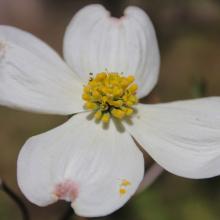
2017 Gosnell Prize Announced
John Grisham has selected William Hamilton's "The Southhampton Insurrection" as the winner of this year's Gosnell Prize in first year writing. Congratulations to William and his instructor Hilary Holladay.
Congratulations as well to this year's finalists:
- Lucas Beasey and Julia Fisher (Instructor) for "Saltville"
- Kasja Foskey and Derek Cavens (Instructor) for "Forgiveness"
- Lachlan Hassman and Maya Hislop (Instructor) for "Baptism, Beyoncé, and Black Christendom”
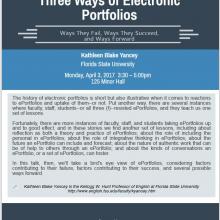
Three Ways of Electronic Portfolios
Kathleen Blake Yancey, Kellogg W. Hunt Professor of English at Florida State University
Monday, April 3, 3:30 - 5:00, 125 Minor Hall
The history of electronic portfolios is short but also illustrative when it comes to reactions to ePortfolios and uptake of them--or not. Put another way, there are several instances where faculty, staff, students--or all three (!)--resisted ePortfolios, and they teach us one set of lessons. Fortunately, there are more instances of faculty, staff, and students taking ePortfolios up and to good effect, and in these stories we find another set of lessons, including about reflection as both a theory and practice of ePortfolios; about the role of including the personal in ePortfolios; about the role of integrative thinking in ePortfolios; about the future an ePortfolio can include and forecast; about the nature of authentic work that can be of help to others through an ePortfolio; and about the kinds of conversations an ePortfolio, or a set of ePortfolios, can foster. In this talk, then, we'll take a bird's eye view of ePortfolios, considering factors contributing to their failure, factors contributing to their success, and several possible ways forward.

Pedagogy Panel: Connecting Writing Courses to the Community Beyond the Classroom
Please join us Friday, April 21st at 4pm in the Faculty Lounge.
Kate Stephenson, Cory Shaman, and Keith Driver will be talking about the questions, difficulties, and advantages of connecting writing courses to the community outside the classroom.

Personal Statement Workshop
Friday, March 31 2-4PM; 229 Bryan Hall
- Attend a panel presentation led by writing center tutors
- Complete generative writing exercises to get you started on your essays
- Work with an experienced writing center tutor on your current draft
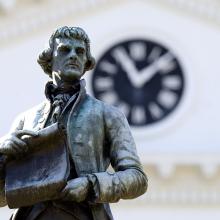
Gosnell Prize Finalists Announced
The Academic and Professional Writing Program is pleased to announce the finalists for this year's Brett B. Gosnell Prize in First Year Writing.
Lucas Beasey “Saltville” (instructor Julia Fisher)
Kajsa Foskey “Forgiveness” (instructor Derek Cavens)
William Hamilton “The Southampton Insurrection” (instructor Hilary Holladay)
Lachlan Hausmann “Baptism, Beyoncé, and Black Christendom" (instructor Maya Hislop)
The final judge for this year's prize will be John Grisham.

Welcome New Writing Program Faculty
The Academic and Professional Writing Program welcomes four new colleagues at the start of the 2016-17 academic year:
Steph Ceraso
A former lecturer at Georgetown University (2013-14) and assistant professor at the University of Maryland, Baltimore County (2014-16), Ceraso has published scholarship in College English, Composition Studies, Currents in Electronic Literacy, and other journals. Her 2014 article on sonic pedagogy, “(Re)Educating the Senses,” won the 2015 Richard Ohmann Award, a national award recognizing her refereed article in College English for making a significant contribution to the field of English studies. Ceraso is working on her first book, which proposes an expansive approach to teaching with sound in the writing classroom.
She earned her Ph.D. in English from the University of Pittsburgh (2013), an M.A. in English literature from the University of Vermont (2006) and her B.A. in English literature from Washington & Jefferson College, where she graduated Summa Cum Laude (2004).
She is planning to develop innovative new composition courses that focus on digital production. Her research and teaching interests include multimodal composition, sound studies, pedagogy, digital rhetoric, disability studies, sensory rhetorics, gender and women's studies, music and pop culture.
This fall, Ceraso is teaching "Writing with Sound," a class in which students will create an original, three-episode podcast series.
John T. Casteen, IV
A poet and essayist whose work addresses culture, visual experience, ethics, and history, John T. Casteen is the author of two books of poems, Free Union and For the Mountain Laurel, both from the University of Georgia Press’ VQR Poetry Series. His recent work includes “The Imaginary City,” an interdisciplinary project in essay, poems, and photographs from China, and “Memory: Viajar,” an essay-film in progress from Peru.
His poems have appeared in Fence, The Paris Review, The Southern Review, Ploughshares, and other literary magazines, and have been anthologized in Monticello in Mind: Fifty Contemporary Poets on Jefferson, Best American Poetry, and The Rumpus Poetry Anthology. In addition, he has contributed to Slate.com, The Chronicle of Higher Education, The Washington Post, The Morning News, and VQR. Nominated several times for the Pushcart Prize, Casteen has been awarded the Virginia Foundation for Independent Colleges’ Mednick Fellowship, New York University’s Visiting Artist Faculty in Residence, and a Faculty Fellowship Residency at the Virginia Center for Creative Arts.
Casteen holds a B.A. from the University of Virginia (A&S ‘93) and an MFA in Poetry from the Iowa Writers’ Workshop. He has taught previously at James Madison University, on Semester at Sea, and at Sweet Briar College, where he founded a national conference for undergraduate students of creative writing. This fall, he will teach the courses “Writing About Culture and Society” and “Communicating with the Public.”
Cory Shaman
Cory Shaman’s research, teaching, and publications focus on the material histories and representations of environmental injustice, often in the context of post-natural conceptions of the environment. His work takes specific form in examining the growing archive of film and literature related to Hurricane Katrina, and much of his most recent scholarship has explored the ethics of food systems in the American South from a critical vegan perspective.
Shaman’s specific interest in how non-human interests are excluded or obscured in decision-making processes arises from a desire to imagine legitimately just and sustainable arrangements that more fully and seriously account for the lives that historically have been most discounted.
Shaman earned his Ph.D. in English, with concentrations in environmental and regional U.S. literature, from the University of Mississippi (2007).
At the University of Virginia, Shaman will teach introductory courses on critical inquiry, within the Academic and Professional Writing Program, along with associated upper-level undergraduate writing intensive classes.
Kate Stephenson
An alumna who received both of her graduate degrees from the University of Virginia, Kate Stephenson returns to UVA to teach in the Department of English’s Writing Program. Her academic research focuses primarily on composition and pedagogy, but she has also published articles and presented papers on Sylvia Plath, modern poetry, children’s literature, and online education.
Before joining the Writing Program, Stephenson was an editor for the Core Knowledge Foundation (2014-15) and a lecturer in the Composition and Humanities Departments of Kaplan University (2003-2016). In 2012, Kaplan’s College of General Education presented her its Outstanding Faculty Award. She also worked as a lecturer in the English Department of Trinity University in San Antonio, Texas (2002-03).
She worked one term as a lecturer in UVA’s Department of English after completing her Ph.D. in English literature (2001). She also completed her M.A. in English literature at UVA (1997) and graduated Summa Cum Laude, with Phi Beta Kappa honors from Duke University, where she completed her B.A. in English literature and German language and literature.
This fall, Stephenson will teach "Writing and Critical Inquiry: Writing about Photography" and "Travel Writing." She is currently designing an advanced writing course that focuses on community engagement and literacy, and in the spring, she looks forward to leading a one-credit pilot course exploring the relationship between writing, community engagement, and leadership.
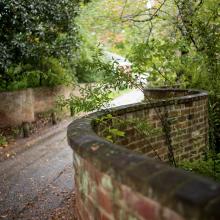
Gosnell Prize Winner Selected
The Academic and Professional Writing Program is delighted to announce that Fiona Geiran and her ENWR 1510 Instructor Theresa Kim are the winners of this year's Gosnell Proze for the best first-year writing essay. Fiona and Theresa will each receive $1000 and attend a luncheon with Program administrators and the Gosnell family to celebrate and to remember Brett Gosnell, in whose honor the prize was established.

